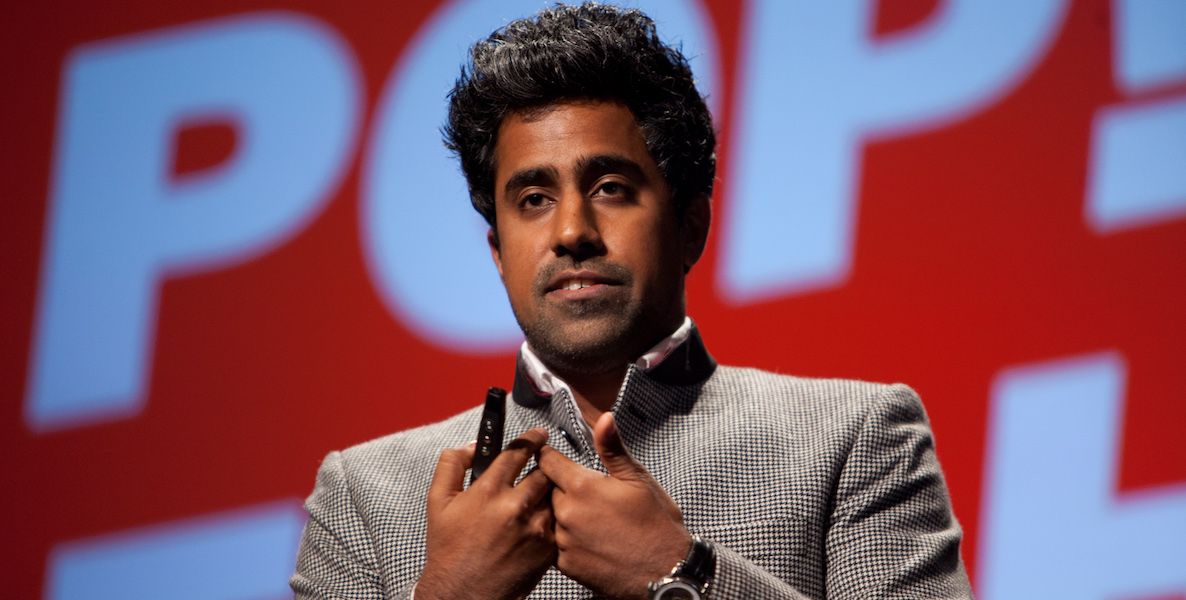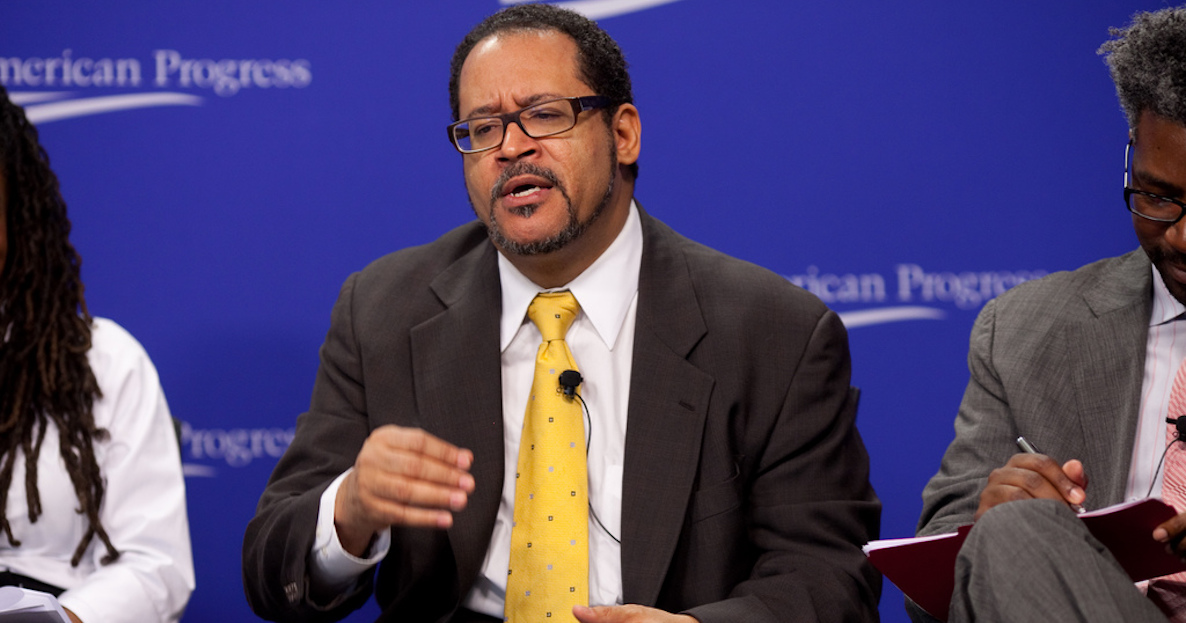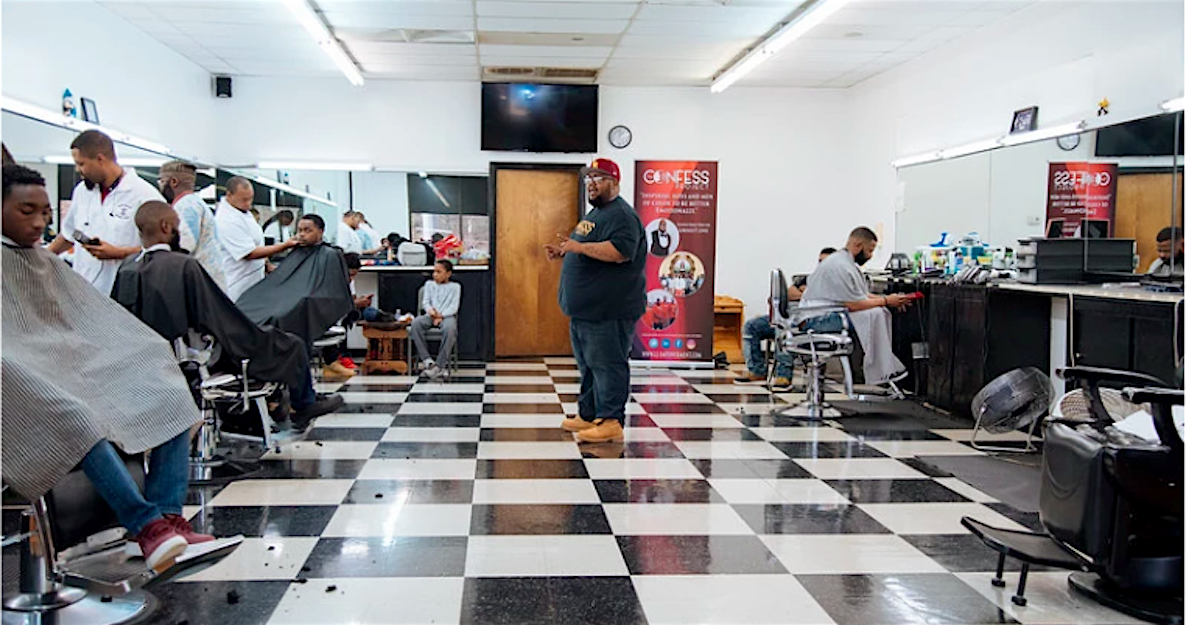When hearing about the Goodfellas that want to get you to talk, you might conjure up images of Robert de Niro, cocaine, and dead bodies in a trunk as seen in the 1990 mob drama. But the barbers at the Goodfellas barbershops in Little Rock, Arkansas, are literally “good fellas,” and they do more than buzz beards.
One afternoon a big man with a white ghostbusters mask stands in the middle of the barbershop and tries his best to keep his composure. “How are you?” Lorenzo Lewis asks the young man with the mask, while half a dozen barbers around him trim sideburns and plait cornrows, all listening intently.
“Good, good,” the masked man deflects.
“I noticed you seem a little tense lately,” Lewis probes gently, until the man finally admits he’s going through a really rough time. “Do you have suicidal thoughts?” Lewis continues.
The man nods. He takes off his mask, and the conversation that unfolds sounds like anything but typical barbershop gossip.
“The barbershop is a staple in the black community,” Lewis says. “And I want it to be a safe space where people can go and talk honestly about themselves.”
This is how it starts for the Confess Project, a mental health initiative for men and boys of color, created by 30-year-old Lewis. Studies show that black men are among the most traumatized people in the country, for whom suicide is the third-leading cause of death. Yet they are also the least likely to seek help.
![]()
In Philadelphia, according to an April study from Penn of black men who had experienced trauma—including gun shots and accidents—68 percent had depression and 50 percent PTSD three months after the incident; yet just 30 percent had even attempted to seek social services. Partly, this was cultural: Several of those in the study told researchers they felt weak for needing therapy, and judged for it by their community.
Three years ago Lewis had a cutting-edge idea: If the people who need it most don’t go to therapy, why not bring therapy to the people? “The barbershop is a staple in the black community,” Lewis says. “And I want it to be a safe space where people can go and talk honestly about themselves.”
Lewis often uses the white mask because “it represents stigma, also the struggle, the ‘man-up’-syndrome. I do a two-minute exercise with the guy to show how men hold in their pain until he takes the mask off.”
Lewis knows what he’s talking about, and often starts the conversation by sharing his own story: He was born in prison and lost his dad at a young age. When he was crying in 6th grade because he missed his dad, his teacher told him to “man up.”
“Hearing that as a 13-year-old was hard,” Lewis admits. “I felt I was all alone in the world.” He joined a gang and by his own admission “almost became part of the prison pipeline system” at 17 years old.
![]()
The only space where he felt safe was his aunt’s beauty salon. A barber there talked him into getting professional help, and the therapy turned his life around. “Therapy has literally allowed me to turn my weaknesses into strength,” Lewis says. He felt he benefited from therapy and became a mental health advocate, focusing on suicide prevention, and worked for nine years in an institution for troubled kids and teenagers.
For his “Beyond the Shop” initiative, Lewis is not only inviting trauma therapists to visit barbershops, but the therapists are training barbers to recognize early signs of depression and instability, to skillfully steer the conversation, ask helpful questions, and direct their clients to mental health resources if needed. (The National Alliance on Mental Illness is a supporter of the project.) The men pay the usual fee for their shave, the talk is free.
Black men are among the most traumatized people in the country, for whom suicide is the third-leading cause of death. Yet they are also the least likely to seek help.
Lewis recognized that one reason black men often don’t seek help is that they are unlikely to see a familiar face in a formal practice: “Did you know that less than three percent of therapists in this country are black men?” Lewis says. “That’s why barbershops are important. We have to put activists on the ground.”
The connection between cleaning out emotional baggage and getting cleaned up is a natural one. Men are already used to talking freely about their lives on barber chairs, and the Beyond the Shop training is a means to deepen the conversation. “This community needs someone to uplift them,” says Matt Dillion, the Goodfellas’ owner.
Lewis is particularly proud of a barber in Columbia who went through a bad divorce and was getting increasingly depressed. “The barbershop talk gave him some confidence to talk about it and get some clarity of what’s going on and get help,” Lewis says.
![]()
While this project primarily addresses black men, women benefit too—either directly when they work in the barbershops, or indirectly when their partners, sons, and fathers finally get the help they need. Keshara Richardson, a stylist at Kuts Unlimited in New Orleans, struggles with PTSD after having been shot in her abdomen. “Because of that, it’s hard to be as social as I used to be,” she says. “In this shop we try to open to everyone, create a space where you can talk about anything.”
Dozens of barbers in Arkansas, Kentucky, Tennessee, South Carolina, Atlanta, and New Orleans have adopted Lewis’s training with great results; others use the idea to focus on health or weight counseling. Barbershop Confessions is one of several new programs around the country bringing health and mental health awareness to people where they spend their time. For instance, the Black Barbershop Health Outreach Program in Inglewood, California, has devoted their program to health check-ups. Its barbers check not only side partings, but also blood pressure; now national, it claims to have screened over 80,000 African American men in 800 barbershops around the country.
The coffee shop Sip of Hope in Chicago trained its baristas to recognize suicidal clients and serve up a new perspective along with the latte. 100 percent of the revenues are donated to suicide prevention. “It’s ok not to be ok,” cursive letters assure clients over an entire brick wall. Library employees in Sacramento volunteered to get trained in mental health counseling so that they are better able to support the many homeless that often seek shelter under the library roof. (Librarians in some Philadelphia Free Library branches have taken on similar roles.) And in Duluth, Minnesota, the entire city advertises that business owners are trained to support clients who suffer from dementia.
Though Lewis has reached out to barbershops in Philadelphia, his Barbershop Confessions is not actively cooperating with any shops here yet. But it may soon, as Lewis is now taking his project on tour in 20 cities. His motto works for haircuts as well as for therapy: “One size does not fit all.”
The Confess Project





